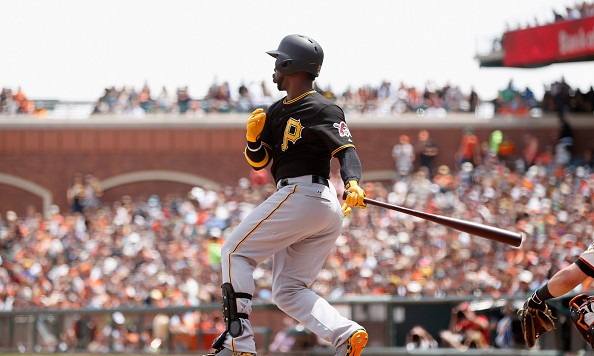I cannot and will not pretend to speak for anyone else, but much of my pre-hot-streak-Pirate-angst was fueled by the memory of 2014, when the Pirates played baseball as well as just about anyone in the season’s last ~110 games and came up short in the NL Central based on how bad they were in the first ~50. Most of that fear is stoked by Cardinal Devil Magic. You can go back through the day-by-day 2014 standings and see how far the Pirates were behind the Brewers for much of the season and how much ground the Pirates made up from June onwards, but they spent much of the season juuuust barely behind the Cardinals, and no matter how much they heated up, they couldn’t ever close that gap. The Cardinals are the standard, the division title is the goal, the more distance between the two clubs, the more nervous I get.
As a result, I get a little bit itchy thinking about how a scorching hot 11-2 run still has the Pirates six games behind the Cards. I know there’s time left, I know the Cardinals won’t win baseball games at a .660 clip for the rest of the season, I know it’s only June, but I still find it hard to ignore the distance between the two clubs right now. The greater that distance is, the less control the Pirates have over their own fate; it’s that straightforward.
Of course, I can do better than this. Let’s ask an easy question: how big of a deficit in a division would be a big deficit to overcome on June 4th? Let’s go back a few years. The format for each season is: eventual division champion (division standing after games played on June 3rd)
- 2014: Orioles (4 1/2 behind the Blue Jays), Tigers (first place), Angels (5 1/2 behind the A’s), Nationals (2 1/2 behind the Braves), Cardinals (five behind the Brewers), Dodgers (7 1/2 behind the Giants)
- 2013: Red Sox (first place), Tigers (first place), A’s (1 1/2 behind the Rangers), Braves (first place), Cardinals (first place), Dodgers (7 1/2 behind the Diamondbacks, last place)
- 2012: Yankees (1 1/2 behind the Rays), Tigers (six behind the White Sox), A’s (nine behind the Rangers, last place), Nationals (three-way tie for first place), Cardinals (3 1/2 behind the Reds), Giants (three behind the Dodgers)
- 2011: Yankees (first place), Tigers (4 1/2 behind the Indians), Rangers (first place), Phillies (first place), Brewers (two behind the Cardinals, who ended up winning the World Series anyway, those jerks), Diamondbacks (1/2 behind the Giants)
- 2010: Rays (first place), Twins (first place), Rangers (tied for first), Phillies (three behind the Braves), Reds (tied for first), Giants (3 1/2 behind the Padres)
If we count all five of these seasons, we’ve got 30 division champions. Only 13 of them were in first place after the games played on June 3rd. In every single year that we’re looking at here, at least one team that was in first place after June 3rd failed to win their division. Of the 17 teams that came back to win their divisions, though, only four were six games or further back in their division.
Things look a little bit different if we just look at the two wild card era, though. In the last three seasons, only five of the 18 eventual division champs were in first place on this date (two of those four were the Cardinals, of course). All four of the teams came back from the 6+ game deficits played in these three seasons — last year’s Dodgers, 2013’s Dodgers, 2012’s Tigers, and 2012’s A’s. I’m not sure we can draw a conclusion about how the second wild card has affected division races with such a small sample, but I suppose it’s fair to say that the divisions have seen a lot of in-season turnover the last few years.
We can, however, make a couple of conclusions from this sort of thing. Division leads are certainly not safe on June 4th, and the six game lead that the Cardinals have on the Pirates falls within the range of divisional leads that have been blown at this point in the season. It’s probably a little bit closer to the fringe of that range than most Pirate fans would like, but it would hardly be earth-shattering for a team down by six games on June 4th to win a division. That being said, this 11-2 streak came at pretty much the perfect time. We’d probably all be relatively happy if the Pirates went, say, 9-4 instead of 11-2 over these last 13 games, but there’s only one team in the last five years that’s comeback from a deficit that size or larger. That’s the razor’s edge I’m concerned with; it’s one thing to note that four of the last 18 division champions were at between six and nine games back in June 4th, but a much smaller percentage of teams that were 6-9 games back on June 4th actually wound up winning their divisions.
Of course, the Pirates were nine games back when this hot streak started, and they’re six games back now. Maybe it’s not ideal, but it’s better than it was two weeks ago. If we can say that again two weeks from now, maybe we’ll have a real division race on our hands.
Photo by Ezra Shaw/Getty Images




















